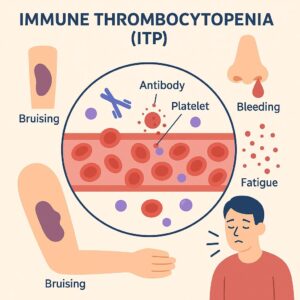Immune thrombocytopenia (ITP) is an autoimmune disorder where the immune system mistakenly attacks and destroys platelets, which are blood cells that help with clotting. This leads to an abnormally low platelet count, increasing the risk of bruising and bleeding—even from minor injuries.
ITP can be acute (short-term) or chronic (lasting more than 6 months) and may occur on its own or alongside other autoimmune diseases.

